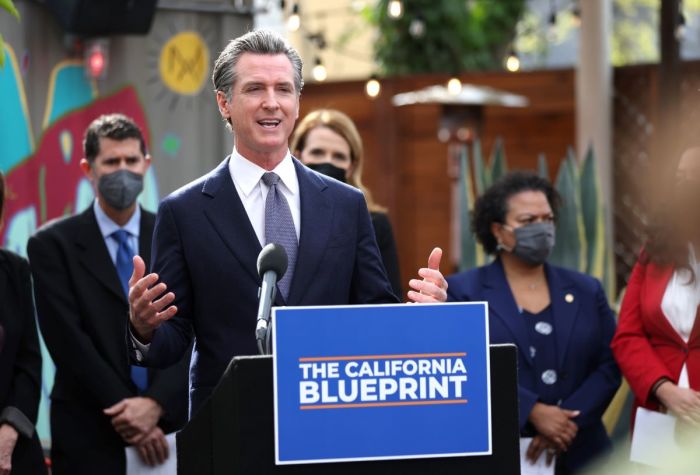Newsom's vow to stop doing business with Walgreens over abortion pill would violate federal law

California Gov. Gavin Newsom's office walked back the governor's claims that the state is "done" doing business with Walgreens after the pharmacy chain announced it would not distribute the abortion pill in states where it's illegal to do so.
Following Walgreen's announcement that it would not dispense mifepristone in certain states after pressure from nearly two dozen attorneys generals, Newsom declared in March that California would withdraw from a $54 million contract with Walgreens. The governor also tweeted that the state would not do business with any company that "cowers" to "extremists and puts women's lives at risk."
However, Newsom didn't consider that federal law requires the state to continue doing business with Walgreens through California's Medicaid program, Medi-Cal, as Kaiser Health News reports.
Medi-Cal provides coverage to nearly 15 million low-income residents and people with disabilities.
If the state stopped covering Medi-Cal prescriptions filled at Walgreens stores, it would violate federal Medicaid requirements, which allow patients to obtain medications at any approved pharmacy, according to the report.
In a statement to the outlet, Tony Cava, a spokesperson for the California Department of Health Care Services, confirmed that the state would not take any action that violates federal law or inhibits low-income individuals' ability to access their medications.
Likewise, a spokesperson for Newsom, Anthony York, clarified in a statement to Kaiser Health News that "Tweeting is not policy." He provided assurances that the governor would not "take any action that hurts people who need access to care."
Walgreens and Newsom's office did not immediately respond to The Christian Post's request for comment.
As CP reported last month, under Newsom's directive, the California Department of General Services gave the company a formal notice that it's withdrawing from a contractual agreement set for renewal in May.
The contract enabled the state to procure "specialty pharmacy prescription drugs," typically used by the state's prison healthcare system. Walgreens had received $54 million from California under the contract.
Walgreens, alongside CVS and Rite Aid, announced that it had taken steps to begin dispensing mifepristone after the U.S. Food and Drug Administration modified restrictions on the drug in January.
Following threats of legal action from multiple Republican state attorneys general, Walgreens announced that it would not dispense mifepristone in over 20 states, as it would be illegal under those states' laws.
In a statement to CP last month, Fraser Engerman, senior director of external relations for Walgreens, disclosed that the corporation was "deeply disappointed" by the state of California's decision not to renew a longstanding contract following the company's decision.
"Walgreens is facing the same circumstances as all retail pharmacies, and no other retail pharmacies have said that they would approach this situation differently, so it's unclear where this contract would now be moved," Engerman stated.
The spokesperson said that Walgreens has consistently made it clear that it would dispense the abortion pill drug only in parts of the country where distributing it is "legally permissible."
"We will dispense this medication consistent with federal and state laws," he vowed. "Providing legally approved medications to patients is what pharmacies do, and is rooted in our commitment to the communities in which we operate."
Earlier this year, the American College of Pediatricians released a 24-page report following the FDA's decision, outlining the risks of taking mifepristone without proper medical supervision.
"Bleeding, cramping, and abdominal pain are commonly associated with a chemical abortion, and approximately 8% of women will experience bleeding for more than 30 days afterward," the report reads. "Planned Parenthood acknowledges the following possible complications after a chemical abortion: bleeding, infection, allergic reaction, retained fetal tissue, and incomplete abortion."
On Friday, a federal judge in Texas suspended the FDA's approval of mifepristone. Another federal judge in Washington issued a preliminary injunction shortly after, prohibiting the FDA from "altering the status quo and rights as it relates to the availability of mifepristone."
The ruling from the Texas judge gave the Biden administration a week to appeal the decision. The U.S. Department of Justice filed an emergency stay motion with the 5th U.S. Circuit Court of Appeals Monday to block the ruling from Texas.
Samantha Kamman is a reporter for The Christian Post. She can be reached at: samantha.kamman@christianpost.com. Follow her on Twitter: @Samantha_Kamman





























